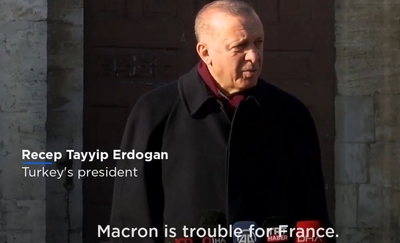 Groups tied to Turkish President Recep Tayyip Erdogan oppose French President Emmanuel Macron's efforts to curb Islamist influence. |
France is trying to suppress the radical networks that promote Islamist separatism. Undertaking an ambitious integration strategy, France aims to curtail Islamism and reintegrate specific segments of its Islamic population that find themselves at odds with the secular French host society. Working with the French Council of Muslim Faith (Conseil Français du Culte Musulman, CFCM), the official state-supervised network of Islamic communities, French authorities in January announced a general framework for the relations between the secular French society and its institutions and the Islamic religion. Featuring 10 essential articles, the Charter of Principles says that that religious belief cannot be used as an excuse to avoid obeying the law. It introduces the notion of the "liberty of conscience" and strongly condemns any discrimination based on sexual orientation. It also introduces an essential perception of "political Islam" as a serious internal threat for the stability of the French Republic. In this context of opposition to political Islam, the Charter of Principles mentions Salafism, the Muslim Brotherhood and the Tablighi Jamaat organization, all of which are active in France.
Most French Muslim organizations accepted the proposed Charter, thereby affirming their ideological commitment to the principles of the French Republic and their rejection of radical Islam. Still, there were strong objections, including a coordinated reaction by groups affiliated with Erdogan's Turkey. Three major Islamic organizations issued a joint communique April 6 condemning the "interference of the state" in religion and the "political instrumentalization" of this issue by French authorities.
The statement was signed by the Millî Görüş Islamic Confederation (CMIG), the Committee of Coordination of Turkish Muslims (Comité de coordination des Musulmans Turcs de France, CCMTF) and Foi et Pratique, an offshoot of the revivalist ultra-conservative Tablighi Jamaat.
Turkey's Role in Promoting Islamist Confrontation
Millî Görüş, active in France since 1995, is a Turkish Islamist organization close Erdogan's ruling AKP party. Millî Görüş controls 30 percent of the mosques attended by Turkish and other Muslim residents in France, according to Samim Akgönül, director of the Department of French Studies at the University of Strasbourg. Its president, Fatih Sarikir, also serves as general secretary of the French Council of Muslim Faith.
"The target is not only the imams, but also the Muslims in general," Sarikir told Turkey's state-controlled Anadolu news agency in February. Sarikir reportedly has been on French authorities' radar for his activity. French security services describe him as "a person with ties to the radical Islamist movement," Journal du Dimanche reports. The CCMTF, under its President Ibrahim Alci, also has special ties to the Turkish government and acts as the long arm of Turkish foreign policy in its relations to European states. CCMTF, although an organization representing French Muslim citizens, has direct ties to the Turkish government through Diyanet, Turkey's Directorate of Religious Affairs.
The Millî Görüş and CCMTF refusal to sign the Charter of Principles is rooted in a concern that Turkey could lose influence and control over imams in France.
The Charter will also provide a framework for a new National Council of Imams that will appoint imams in France, thereby reducing external influence of the Turkish religious authorities. Chems-Eddine Hafiz, rector of the Great Mosque of Paris, is generally favorable towards the initiative because it reduces external control over imams. A lack of resources among mosques, as well as an absence of an official French recognition of imams, lead some to turn to foreign countries for support, he said.
Diyanet often is the place they turn to, allowing it to act as the long arm of the Islamocentric Erdogan regime in various European countries and the United States. France, with an Islamic population approaching 10 percent, has always been one of Diyanet's most active fields. Diyanet and DITIB, the German branch of Turkish-controlled religious organizations, control about 250 mosques in France and pay the salaries of about 150 Turkish imams working there.
In its attempts to curtail Islamist activity and interference from Erdogan's Turkey, France often finds itself at odds with municipal authorities controlled by the country's leftist political spectrum. The city of Strasbourg recently granted €2.5 million to complete the grand mosque Eyyub Sultan. French Interior Minister Gérald Darmanin criticized what he saw as the support of Millî Görüş, calling it a "federation that defends a version of political Islam" and features "an Islamist character, as it does not condemn either political Islam nor homophobia."
The Strasbourg mosque will become the largest in France. Turkish interference has been particularly active in Strasbourg, with the mobilization of local political organizations who share the Islamo-centric views of Erdogan's regime.
The Party of Egality and Justice (PEJ), founded by Turkish migrants in 2015, works with Erdogan's AKP party promoting Turkey's image and interests in France. PEJ's links to Erdogan's Turkey were highlighted in May 2017 by Mine Günbay, in charge of women's rights in Strasbourg's municipal council. Through PEJ's work, she said, Strasbourg had become "a political laboratory of AKP party." PEJ members also founded another NGO which promotes Turkish state propaganda, such as a refusal to recognize the Armenian genocide.
This seemingly odd alliance between leftists and Islamist ambitions has caused concern. According to an IFOP February poll, 58 percent of French people consider that Islamo-leftism a widespread current of thought in their country.
France is facing a two-track war against Islamist networks that act in coordination with outside actors like Turkey, and against a naïve perception of the toll of political Islam in European societies. This is a battle that France, in its defense of secular values and internal peace, cannot afford to lose.
Ioannis E. Kotoulas (Ph.D. in History, Ph.D. in Geopolitics) is adjunct lecturer in Geopolitics, University of Athens.
Copyright © 2021. Investigative Project on Terrorism. All rights reserved.


